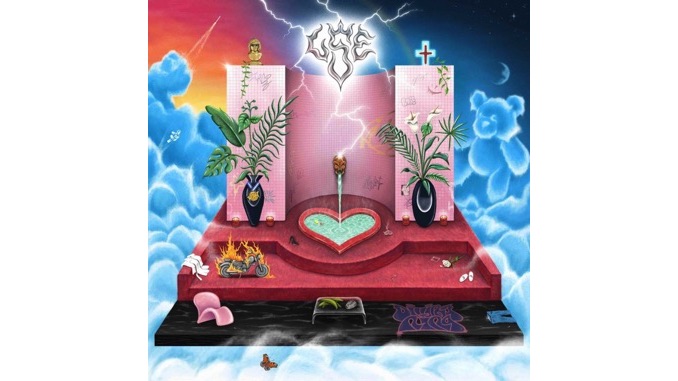Divino Niño Redefine Themselves on the Bold, But Uneven Last Spa on Earth

There’s this recurring dream I have where I’m sitting in a room filled with shelves and shelves of glittering objects, and am too overwhelmed to appreciate any of them fully. Last Spa on Earth, the latest album from (former) psych-pop band Divino Niño, evokes that same wonderstruck, dream-like feeling—as well as that of being overwhelmed. Released via Winspear, the LP benefits greatly from the Chicago-via-Bogotá band’s willingness to push themselves, but at times, they try to crowd too many choices into one song.
This foray into a mix of reggaeton, trap and electro-pop leaves the listener with colors swimming before their eyes. The LP feels like breaking free of any baggage that the band’s past has left them with. Camilo Medina, one of the band’s founding members, comments in press materials, “For most of my life, I was just perfectly happy listening to really chill music and drawing flowers. Having no choice but to sit with ourselves during the pandemic was dark but it was also therapeutic dealing with what we weren’t dealing with before.” It’s difficult to delve into darkness while still keeping things poppy and upbeat, but Last Spa on Earth generally manages to straddle that line, with jaunty tunes accented with horns and rhythm guitar balancing out the more foreboding tracks.
In general, however, many songs seem to get lost in the next, even though each track is still somehow a bit too much. For example, “Ecstasy” serves as a fun electro-pop song, with glimmers of synth underlaid by beats that beg to be danced to. But randomly, a harsh section of glitched autotune breaks up the party, making it hard to follow the song as a cohesive whole. Of course, the genres Divino Niño delve into here practically demand overstimulation, and is why so many seek similar music out. But music that does it artfully leads the listener a bit more, using build-ups and transitions to better invest the audience in the path of the songs. Last Spa on Earth feels like a cake that had all the right ingredients, just added in the wrong order.
Songs that balance the old and new sounds and feelings of Divino Niño work best. “Drive” starts off with such dreamy synths that it could almost have been done by the band four years ago, but becomes an upbeat pop tune with a dug-in rhythm, and moves into an autotuned rap section organically, making it feel like a natural progression of the song. The infectious beat continues throughout, tying the sonic narrative together as the track moves through a wide variety of sounds and moods, and making it a successful jam. “Mona” makes you smile as soon as it starts for reasons that are hard to pin down. It’s starry-eyed until it speeds up, with a rap hurrying over the synths in a way that textures the song, making it interestingly multi-dimensional.
Meanwhile, “Miami” is so intensely filled with sharp beats and different autotuned sections that you almost watch it take shape in your hands. The song feels like a forceful rush, leaving you giddy and lightheaded at just two minutes and 27 seconds, and is well-placed in its transition to the sweeter, more welcoming “Mona.” It’s songs like these that break up the mix as, at times, the album struggles to not become a vibey blur. Ironically, “Especial” is the track that fades most into the background, sandwiched between “Mona” and “Papelito” on the superior second half of the LP. With lyrics like, “Everything is special, don’t you know?” one wonders if they are trying to convince themselves, or make an excuse. Perhaps it is just this mindset that derails the album: By treating everything as the most special and exciting, nothing can stand out. At worst, it’s as though the band went into a sonic candy store, and started pointing at and asking for everything.
“LSE” is a well-done introduction to the album as a whole, setting the right balance between the nostalgia and dread that seem to serve as the LP’s lining, and gently indicating that this will be unlike the Divino Niño you have heard before. But the second track, “Nos Soltamos,” exemplifies some of the album’s main issues: The vocal rolls and gusty sighs in the background come off as cheesy and off-putting, and the beat is fun, but not enough to make you remember the song for more than 30 seconds after hearing it. Same with “Tu Tonto”: The music loses its urgency where it would benefit most from it.
Amidst all the overlapping musical elements, however, the band seems have put a lot of focus into the lyrics, mixing in some truly beautiful moments. “Wouldn’t you like to find / That your soul can float in the sea / With your body again?” they ask at the very end of “Nos Soltamos,” a song about a hungry, bittersweet romance, in which they also throw in a casual mention of “Eating the moon.” With lines like, “I can float into your dreams when I am nothing / Ain’t got a worried mind, ain’t got no stress on my back / Because I’m making believe I am nobody,” in “I Am Nobody,” the motivation behind the album begins to be revealed, and we connect with the fear and inner searching out of which this album was birthed, allowing us to more deeply empathize with the songwriting. Such tucked-in moments provide an unexpected sweetness to an album otherwise underlaid by dance beats.
These lyrics thrive because, with a poetic twist, they state things plainly, with no over-convolution. It’s a funny thing to have to remind oneself of, but sometimes, even in electro-pop, less is more.
Rosa Sofia Kaminski is a Paste Music intern, writer, climber of trees and collector of odd treasures that she quickly loses, and is based in Ann Arbor, Michigan. She can be reached at @rosa.sofia.k on Instagram.
Revisit Divino Niño’s 2014 Daytrotter session below.







































